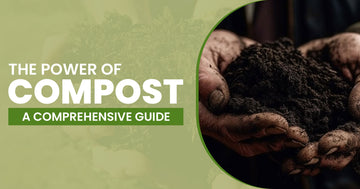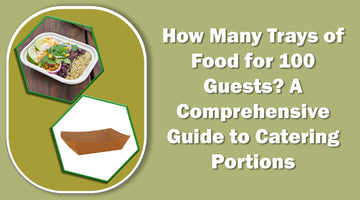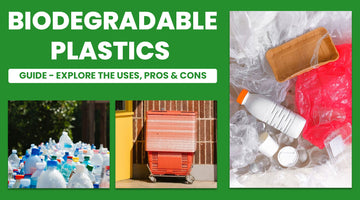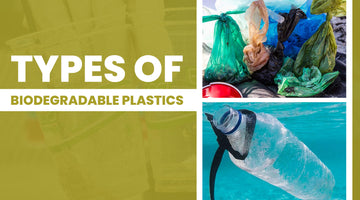
Compost, often referred to as "black gold," is a nutrient-rich organic matter created through the natural decomposition of organic materials. It's a way of recycling kitchen scraps, yard waste, and more into a valuable soil conditioner. But what exactly is compost?
Compost results from a controlled, biological decomposition of organic materials such as food scraps, leaves, and yard trimmings. This process transforms waste into a dark, crumbly, and nutrient-rich material that benefits your garden and the environment. Composting is a simple yet powerful way to reduce waste, enrich soil, and promote a sustainable future.
Why Compost at Home?

Home composting is not just an eco-conscious choice; it's also a practical one. By composting at home, you divert organic waste from landfills, reduce greenhouse gas emissions, and nurture your plants with a natural fertilizer. It's a win-win for you and the planet.
Benefits of Home Composting
Composting at home reduces landfill waste, lowers carbon footprint, and produces nutrient-rich soil for healthier plants.
Options for Composting at Home
Various methods to compost at home, depending on your space and preferences. The most common options include backyard composting, vermicomposting (using worms), and indoor composting. Each method has advantages, so you can choose the one that best suits your lifestyle and available space.
Composting in Your Backyard
The Backyard Composting method utilizes outdoor bins or piles to create compost. It's ideal for larger yards and produces substantial amounts of compost. It is an excellent way to turn your kitchen and yard waste into a valuable resource for your garden. You can create nutrient-rich compost right in your backyard by following simple steps. Manage your compost pile properly to avoid attracting unwanted guests like rodents.
Backyard Composting Tips

Here are five essential tips for successful backyard composting.
Balanced Materials
Ensure a proper balance of "browns" (carbon-rich materials like dried leaves, straw, or cardboard) and "greens" (nitrogen-rich materials like kitchen scraps and grass clippings). This balance provides the necessary nutrients and microorganisms for efficient decomposition.
Adequate Aeration
Regularly turn or aerate the compost pile to introduce oxygen. Oxygen is crucial for aerobic decomposition, preventing unpleasant odors and encouraging beneficial microorganisms to thrive.
Maintain Moisture
Keep your compost pile consistently damp, like a wrung-out sponge. Moisture aids in the decomposition process. If it becomes too dry, add water; if it is too wet, mix in more dry, carbon-rich materials.
Layering
Alternate layers of brown and green materials in your compost pile. This layering technique promotes even decomposition and prevents the pile from becoming compacted.
Monitor Temperature
A well-functioning compost pile will generate heat as it breaks down organic matter. Monitor the temperature with a compost thermometer. A temperature range of 120-160°F (49-71°C) indicates active decomposition. If the pile isn't heating up, adjust the balance of materials or aerate it more frequently.
Following these backyard composting tips will create nutrient-rich compost efficiently, minimizing potential issues like odor or slow decomposition.
Compost in Garden Soil
One of the primary uses of compost is enriching garden soil. It improves soil structure, enhances water retention, and provides essential nutrients to plants. To make the best use of compost in your garden, follow these steps:
Ingredients for Composting
To create effective compost, you'll need a balance of carbon-rich "browns" (like dried leaves) and nitrogen-rich "greens" (such as kitchen scraps). Water and air are also critical components for successful composting. Achieving the right mix of browns and greens ensures a healthy compost pile.
What You Can Compost
You can compost various organic materials, including fruit and vegetable scraps, coffee grounds, eggshells, and yard waste. However, some items should be avoided for various reasons. Knowing what you can and cannot compost ensures your pile remains healthy and odor-free.
Steps for Backyard Composting
Here are a few steps for backyard composting.
Layer browns and greens
Alternate layers of carbon-rich browns with nitrogen-rich greens to maintain a balanced compost pile.
Keep the pile moist
Ensure your compost pile is consistently damp, similar to a wrung-out sponge.
Turn the pile regularly
Aerating the pile speeds up decomposition and prevents it from becoming too compact.
Monitor temperature and airflow
Compost should heat up as it decomposes, killing pathogens and weed seeds.
Turning for Success
Regularly turning your compost pile is key to creating nutrient-rich compost efficiently.
Avoiding Rodents
Rodents are attracted to food scraps, so avoid adding too many kitchen scraps to your compost pile. Use a rodent-proof bin or bury food waste under several inches of compost material. Proper compost management, such as layering and covering food scraps, can deter rodents from invading your compost.
What Not to Compost
While composting is a versatile process, some materials should never find their way into your compost bin:
Pet Waste
This waste refers to the feces and urine produced by domestic animals, such as dogs and cats, which need to be properly managed and disposed of due to potential health and environmental concerns. This waste can contain harmful pathogens that may survive the composting process and pose a health risk. Instead of composting pet waste, use dedicated disposal methods to ensure safety.
Inorganic Materials, Such as Plastic
Inorganic materials disrupt the composting process and can harm your garden. These materials don't break down and can contaminate your compost.
Colored or Glossy Paper
These papers often contain toxic chemicals that shouldn't be added to your compost pile. Stick to plain, uncolored paper for composting to avoid chemical contamination.
Diseased Plants
Composting diseased plants can spread diseases to your garden. Isolate and dispose of diseased plants separately to prevent further contamination.
Dairy and Other Animal Products
These materials can attract pests and create unpleasant odors in your compost. Steer clear of animal products in your compost.
More Tips for Composting at Home
Here are some more tips for compost management.
Preventing or Getting Rid of Fruit Flies in Your Compost Bin
Seal your compost bin tightly, and bury kitchen scraps under other compost materials. Proper bin sealing and covering food scraps are essential for preventing fruit fly infestations.
Safety Precautions
Composting is safe, but use gloves and wash hands after handling compost, especially if it contains pet waste. Protect your health by wearing gloves and practicing good hygiene while composting.
How to Use Compost
Incorporate compost into your garden soil or use it as mulch. It can also be added to potting soil for potted plants. Utilize compost as a soil conditioner, mulch, or potting mix additive for optimal plant growth.
Conclusion
Composting is a small action with a big impact. It reduces waste, enriches soil, and helps combat climate change. At Bgreen Today, we are committed to a sustainable future, and our 100% biodegradable and compostable products, including cups, plates, food trays, containers, napkins, and cutlery, align perfectly with the composting ethos. By choosing our products, you're contributing to a greener tomorrow.
Frequently Asked Questions
What is compost made of?
Compost comprises organic materials such as food scraps, yard waste, leaves, and other decomposable items.
How do you make compost?
Compost is made by combining a balance of "browns" (carbon-rich materials like leaves) and "greens" (nitrogen-rich materials like food scraps) in a pile or bin, keeping it moist, aerated, and turning it periodically.
What is compost, and how is it used?
Compost is a nutrient-rich soil conditioner made from organic materials. It improves soil quality, enhances plant growth, and reduces the need for chemical fertilizers.
Is mulch the same as compost?
Mulch is typically a protective layer on the soil's surface to conserve moisture and regulate temperature. Compost, on the other hand, is worked into the soil to improve its quality and fertility.



